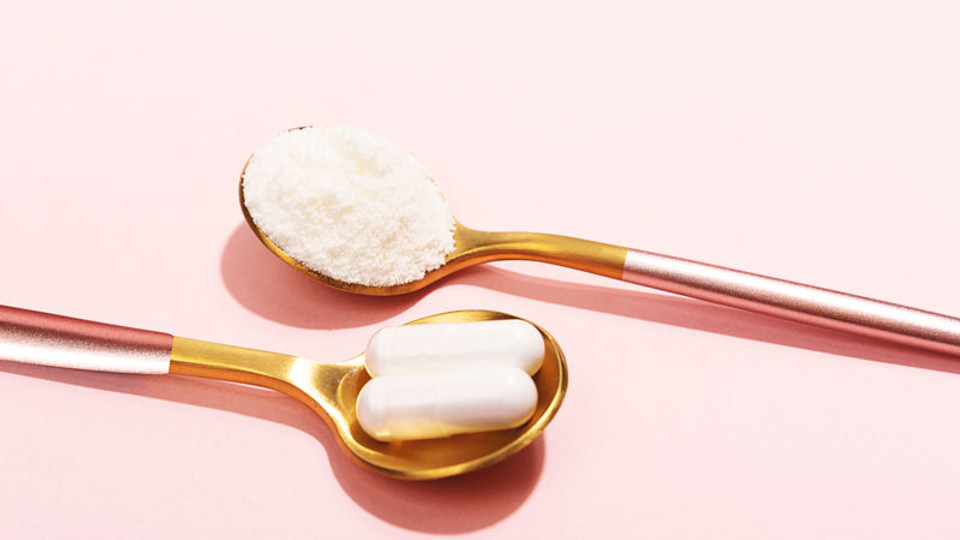
What is Collagen?
Collagen is a protein that is gaining more popularity for its role in injury recovery, gut health, anti-ageing skin and hair health.
It is considered a structural protein because it provides structure and strength to our skin, bones, teeth, cartilage, tendons and ligaments.[1] There are surprisingly 28 different collagen types, but the three main collagen supplements available are Type I, Type II and Type III.
- Type I: mainly found in skin, bones, teeth, cartilage, tendons and ligaments. It is most useful for skin (reducing wrinkles and improving hydration and elasticity of skin), hair and nails
- Type II: mainly found in cartilage, which makes it most beneficial for joint health, injury recovery and arthritic conditions.
- Type III: found in the same places as type I, in addition, to organs, arteries and muscles. Similarly, to type I, it is helpful for healthy skin, hair and nails.
Our bodies can produce collagen but our ability to make collagen decreases as we age and when we are exposed to sunlight and tobacco smoke.

What is collagen made from?
Collagen supplements are made from animal products – fish, cattle, chicken and pigs are the most common sources.
Supplements made from marine animals is considered better absorbed than other animal products due its low molecular weight. Marine Collage contains Type I collagen and is suitable for supporting strong bones and healthy skin and hair health, in addition, to a well-balanced diet.
Is there a vegan alternative to collagen?
Yes, vegan collagen supplements are now available and are derived from genetically modified bacteria and yeast. Unfortunately, research on the effectiveness of vegan collagen supplements is very limited as they are fairly new.
What are the benefits of a collagen supplement?
Since collagen supplements are relatively new, there is not enough evidence to reliably say that they can provide all the benefits as advertised.
- Use of collagen supplements in osteoarthritis to decrease stiffness.[2]
- Use of oral collagen supplements to improve skin elasticity, hydration and dermal collagen density (can positively affect skin ageing) [3]
- Collagen supplementation to minimise muscle loss in older women (70 years +) when consuming a relatively low protein diet. [4]
- Collagen peptide supplementation may improve function of ankle and reduce risk of ankle sprains and injuries in athletes with ankle instability.[5] This may improve performance and prevent injuries in athletes that are prone to soft tissue injuries.
- Improvement of gut health or weight loss with collagen supplements.[6] While collagen has been touted as reducing inflammation and improving leaky gut syndrome – there is no evidence for this. If you’re looking to improve gut health and weight management, you’re better off eating a diet rich in fibre and plant protein.
- The improvement of acne with collagen supplements. While there is anecdotal evidence, there is no research yet to support this claim.
Is bone broth a better alternative to collagen for joint health?
While bone broth does contain collagen, it is significantly lower than supplements and is insufficient to see significant improvements in joint health.
When should you take it?
For injury prevention, it’s recommended to take collagen supplements within 60 minutes of training. For skin, hair, nails or bone health benefits, there are no specific timing recommendations.
Vitamin C helps the absorption of collagen – so don’t forget to take it with your daily Vitamin C tablet or a dietary source of Vitamin C (orange, kiwis, or mandarins).
Does it count towards your total protein intake?
Yes, collagen is protein-rich so it can be counted toward your daily protein intake. It’s important to remember that collagen is not a complete protein (which means it’s missing essential amino acids). Collagen is rich in the amino acids; lysine, glycine and proline but it is low in tryptophan.
Ensure that you are eating a variety of protein sources and not relying on collagen for the bulk of your protein intake. Food sources that are high in tryptophan (the missing amino acid in collagen) include leafy greens, soybeans, chicken, eggs, dairy products, fish, pumpkin seeds and sunflower seeds.
While collagen does contribute to your daily protein intake, I personally wouldn’t replace your whey protein supplement with collagen supplement. This is because whey protein is a complete protein and has more evidence supporting its effectiveness in enhancing muscle building and recovery. If you dislike the taste of whey, however, collagen is naturally flavour-free.
How to eat more collagen?
As always, I believe in taking a food first approach. Foods that are rich in the same amino acids as collagen are protein-rich foods like poultry, beef, chicken, soy products and legumes and beans. Eating vitamin C rich foods is also important in collagen production so don’t skip your tomatoes, capsicums, oranges, strawberries and kiwis.



